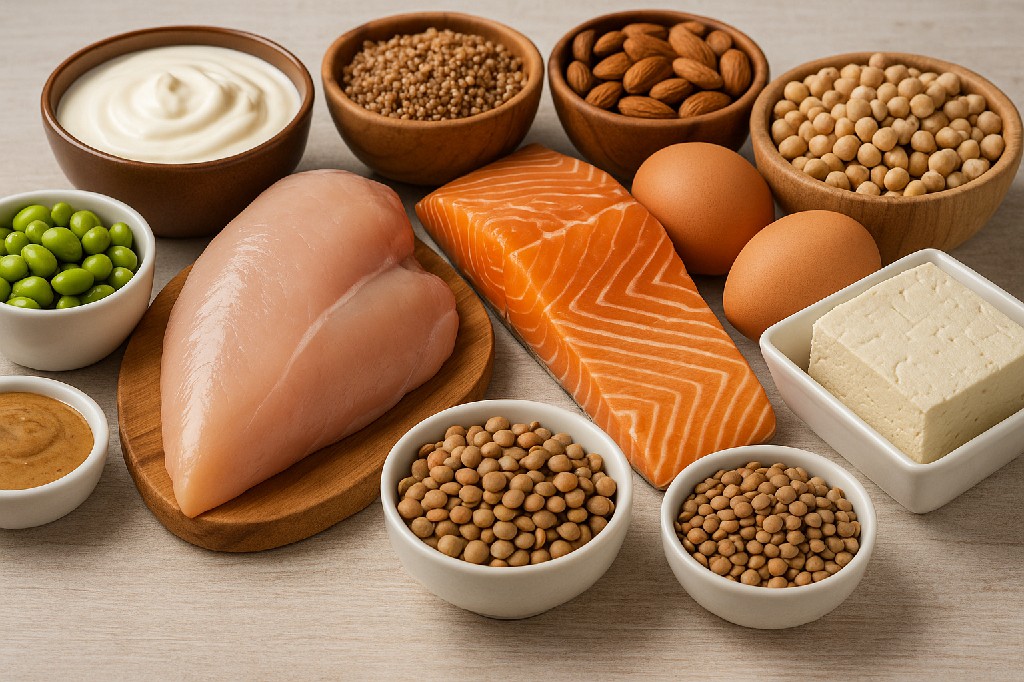Top Healthy Protein Sources for Every Diet
Protein is a critical nutrient for overall health, supporting muscle growth, immune function, and hormone production. Yet, not all proteins are created equal. When choosing healthy protein sources, it’s essential to focus on nutrient density, digestibility, and overall benefits. In this article, we’ll explore the best protein options that fit a wide variety of diets, from omnivores to vegetarians and vegans, so you can nourish your body efficiently and safely.

Why Healthy Protein Sources Matter
Not only do proteins form the building blocks of muscles, but they also repair tissues, transport nutrients, and create enzymes. However, the quality of protein sources impacts health just as much as the quantity. For instance, a highly processed protein may offer grams on the label but lack the nutrients and digestibility found in whole food forms.
Additionally, consuming healthy protein sources can improve satiety, aid in weight management, and help stabilize blood sugar. Transitioning from low-quality to nutrient-rich proteins has been linked to lower risks of cardiovascular disease, diabetes, and certain cancers.
Animal-Based Healthy Protein Sources
Let’s start with animal-based proteins, which are considered “complete” because they provide all nine essential amino acids.
Eggs: A Versatile and Complete Source
Eggs are often considered the gold standard of protein. They’re inexpensive, easy to prepare, and contain high-quality protein along with vital nutrients like choline and vitamin D. Furthermore, the yolk contains healthy fats and antioxidants like lutein.
Chicken Breast: Lean and Accessible
Chicken breast is another staple among healthy protein sources, especially for athletes. It’s low in fat and high in protein, making it ideal for muscle repair and maintenance. Baking or grilling helps preserve its nutritional content without adding unnecessary calories.
Greek Yogurt: Protein with Probiotics
For those who tolerate dairy, Greek yogurt provides an impressive amount of protein along with gut-friendly probiotics. Choose plain, unsweetened varieties to avoid excess sugar and pair it with fruit or nuts for a balanced snack.
Fish: Omega-3 and Protein in One
Fish like salmon, tuna, and mackerel offer protein plus essential omega-3 fatty acids. Omega-3s reduce inflammation and support brain and heart health. Wild-caught options tend to have a better nutrient profile and fewer contaminants than farmed fish.
Plant-Based Healthy Protein Sources
Plant proteins are increasingly popular due to their environmental benefits and lower saturated fat content. Though some are “incomplete,” combining them can offer a complete amino acid profile.
Lentils: Affordable and Nutrient-Dense
Lentils are among the best healthy protein sources for vegetarians and vegans. One cup of cooked lentils delivers around 18 grams of protein along with fiber, iron, and folate. They’re also easy to add to soups, salads, and stews.
Quinoa: A Complete Plant Protein
Unlike many grains, quinoa is a complete protein. It’s also gluten-free and packed with fiber, magnesium, and antioxidants. As a side dish or salad base, quinoa adds texture and nutrition to any meal.
Chickpeas and Hummus
Chickpeas offer a balance of protein and carbohydrates, supporting both energy and muscle maintenance. Blended into hummus, they become a delicious dip that also contains tahini, a sesame seed paste that provides additional protein and healthy fats.
Tofu and Tempeh: Soy-Based Powerhouses
Tofu and tempeh are staple healthy protein sources in many Asian diets. Tofu is soft and mild, while tempeh is firmer with a nutty flavor due to fermentation. Both provide all essential amino acids, plus calcium and iron.
Snack-Friendly Healthy Protein Sources
Finding convenient protein-rich snacks can be challenging. These options are both healthy and easy to pack on the go.
Nuts and Nut Butters
Almonds, peanuts, and cashews offer not just protein but also heart-healthy fats. However, portion control is key due to their calorie density. Choose natural nut butters without added sugar or hydrogenated oils.
Hard-Boiled Eggs
Quick to prepare and easy to store, hard-boiled eggs are one of the simplest healthy protein sources. They’re ideal for a post-workout snack or quick breakfast.
Protein Bars: Read the Labels
While many protein bars market themselves as healthy, it’s crucial to check for added sugars and artificial ingredients. Look for bars with 10+ grams of protein, low sugar, and ingredients like nuts, seeds, and whole grains.
Uncommon but Powerful Healthy Protein Sources
Some less mainstream options offer excellent nutritional value and may surprise you.
Edamame: Young Soybeans with a Kick
Edamame, often served steamed and salted, offers protein, fiber, and vitamins. It’s perfect as a side dish or snack and supports hormonal balance in both men and women.
Hemp Seeds
Three tablespoons of hemp seeds provide about 10 grams of complete protein. Rich in omega-3 and omega-6 fatty acids, they can be sprinkled on salads, yogurt, or smoothies.
Spirulina: A Superfood Protein
Spirulina is a blue-green algae containing up to 70% protein by weight. Though typically consumed in powder form, it’s highly absorbable and also rich in B vitamins, iron, and antioxidants.
How to Combine Healthy Protein Sources for Maximum Benefit
To make the most of your diet, combining different healthy protein sources ensures a full range of amino acids and nutrients.
- Rice and Beans: This classic combo offers a complete protein profile, perfect for vegans.
- Yogurt and Seeds: Mixing chia or flaxseeds into Greek yogurt boosts both protein and fiber.
- Eggs and Vegetables: Scrambled eggs with spinach or peppers offer protein, fiber, and antioxidants.
Moreover, pairing protein with healthy fats and complex carbs can enhance satiety and energy levels. Planning meals with balanced macros helps avoid cravings and energy crashes.
How Much Protein Do You Really Need?
While individual needs vary, general guidelines suggest 0.8 grams of protein per kilogram of body weight for sedentary adults. Active individuals or those aiming to build muscle may need up to 1.6–2.2 grams per kilogram.
Regardless of your dietary style, prioritizing healthy protein sources ensures your body receives the fuel it needs for optimal function. Remember, quality often outweighs quantity.
Final Thoughts on Healthy Protein Sources
Transitioning to a more protein-conscious diet doesn’t have to be difficult. With options ranging from traditional animal proteins to innovative plant-based alternatives, there’s a rich variety of healthy protein sources available.
As you adjust your meals, pay attention not only to protein content but also to overall nutritional balance. Incorporating a mix of complete and complementary proteins will help you build strength, maintain energy, and improve long-term health, without sacrificing taste or variety.
